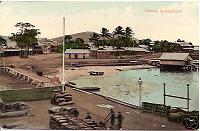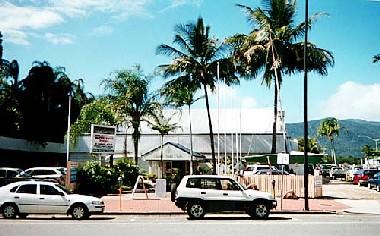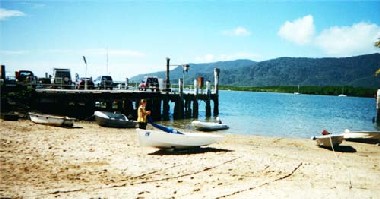THE CAIRNS AQUATIC CLUB
CURRENTLY
CAIRNS YACHT CLUB
The Cairns Aquatic Club, now the Cairns Yacht Club, has been part of the history of Cairns in one form or another since 1908 During this time, the Club has operated under three names Initially it was known as the Cairns Aquatic Club, being formed by several of the regions' business leaders to foster the sport of sailing on Trinity Inlet.
The following is an extract from the Australian Heritage Database
Cairns Yacht Club, Wharf Street, Cairns, FNQ
Nominator's Summary Statement of Significance:
The Cairns Yacht Club (CYC) symbolizes the spirit and culture of early Anglo Saxon settlement of the north, especially the tropical north Queensland, in creating a club both for sailing recreation and social gatherings.
The architecture of the CYC symbolizes an era pre-air conditioning and pre-modern building materials. It symbolizes the spirit of the early settlers.
It is also the only public club on the Cairns Harbour inlet and is also unique geographically in that it is the only beach (natural) in the centre of Cairns.
The club also contains many trophies, flags and honour boards for over past 80 years.
Comments by local historian, Ray Duncan:
The place provides an insight into the Australian pioneering spirit. It is an example of how people, having gained a toe-hold in what was then, a remote, difficult and hostile environment, addressed and sustain the social and sporting needs of a fledgling township. It is a historic yard stick of the effects of worldly, economic and climatic events of the last century when viewed through its sporting and social activities, starting from the earliest days of Cairns to the present day, It is a historical local link that enables one to trace the source of that unique Australian attitude to sport and fair play that is recognised throughout the world, and in this lies its significance.
Description:
A two storey timber and galvanized structure. Lower floor is reception and boat stowage. Top floor is a restaurant, bar, timber dance floor and verandah overlooking Cairns Inlet and small beach. Many small dinghies are stowed on the beach. There is a small wharf adjacent.
Description from local historian, Ray DuncanLocated on Trinity Inlet with its own sand beach, it provides one of the few remaining views, available to all from its full width verandah, across the water to the lush green mangroves that fringe the softer green mountains of the Murray Prior Range. The structure has an external cladding of corrugated iron, that, unlike modern concrete structures, lends itself to the classical romantic view of what many people perceive to be the tropics.
Within its walls will be found recorded history in the form of trophies, cups, honour boards, photographs, minutes of meetings and other memorabilia. The ambience within is classically tropical. It is proud of its local timber dance floor, that has supported the social needs of the community over the years.
History:
Re-built in 1920, and located in its present position for over eighty seven years, it is a structure that provides a historic insight into aquatic sporting pursuits and social events of Australians of the North Queensland variety from the late eighteen hundreds to the present day.
Condition and Integrity:Reasonable but a good coat of paint would enhance the exterior. The inside is beautifully maintained.
Location:Wharf Street, Cairns
It has been most gratifying and encouraging that Cairns residents have been joined by not only fellow Queenslanders, but fellow Australians and former visitors to the Aquatic and Cairns Yacht Club from various parts of the world offering support for this grand old historic site.
However, without Queensland Heritage or Australian Heritage listing the days of the historic Cairns Aquatic Club seem numbered!
From a cultural and historical perspective, it simply defies belief that any elected party politicians can wilfully destroy the last remaining Cairns waterfront heritage site in the name of 'progress'!
 |
 |
 |
|
1907 site |
2007 site |
Cairns CBD last natural sand beach site |
RETURN TO: CAIRNS HERITAGE GROUP
